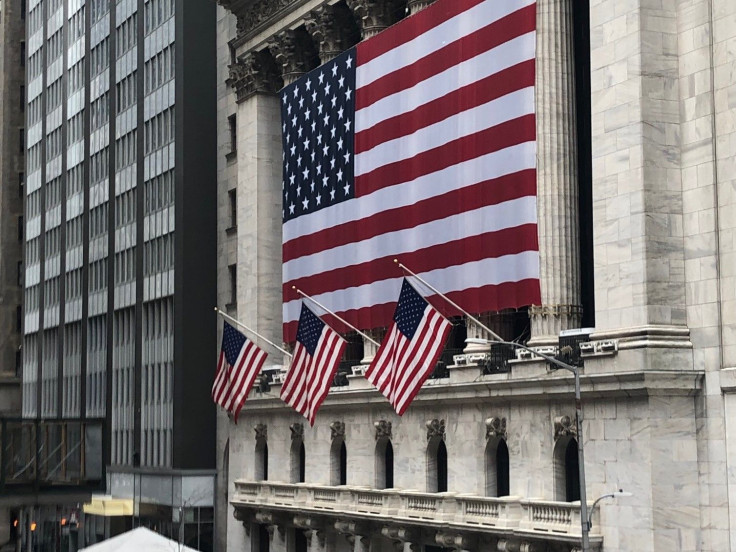Wednesday’s Stock Market Open: US Equities Fall As Fed Chief Powell Sees Significant Downside Risks

KEY POINTS
- Fed chief Powell warned "the path ahead is both highly uncertain and subject to significant downside risks."
- U.S. producer price index fell 1.3% in April after slipping 0.2% in March
- Los Angeles County’s public health director said its stay-at-home order will likely last through July
Upgrade: 12:05 p.m. EDT:
U.S. stocks incurred deeper losses as of noon on Wednesday.
The Dow Jones Industrial Average dropped 464.67 points to 23,300.11, while the S&P 500 fell 47.76 points to 2,822.36 and the Nasdaq Composite Index tumbled 138.78 points to 8,863.77.
In Europe markets sank, as Britain’s FTSE-100 fell 1.51%, while France’s CAC-40 tumbled 2.85% and Germany’s DAX dropped 2.56%.
Original story:
U.S. stocks opened lower on Wednesday as traders considered the feasibility of more states reopening their economies as Fed chief Jerome Powell called for more action by the government to fight of economic collapse.
The Dow Jones Industrial Average dropped 287.6 points to 23,477.18, while the S&P 500 fell 29.23 points to 2,840.89 and the Nasdaq Composite Index tumbled 72.15 points to 8,930.40.
Federal Reserve Chairman Jerome Powell said on Wednesday morning that the central bank and Congress may have to unveil more programs to save the U.S. economy.
“While the economic response has been both timely and appropriately large, it may not be the final chapter, given that the path ahead is both highly uncertain and subject to significant downside risks,” Powell said.
He added: “Additional fiscal support could be costly, but worth it if it helps avoid long-term economic damage and leaves us with a stronger recovery. This trade-off is one for our elected representatives, who wield powers of taxation and spending.”
The Labor Department said on Wednesday the U.S. producer price index fell 1.3% in April after slipping 0.2% in March.
Los Angeles County’s public health director said its stay-at-home order will likely last through July. But some other states have already gradually started to reopen some businesses.
“You have a market just waiting to see how the economy opens,” said Quincy Krosby, chief market strategist at Prudential. “After nearly six sessions of the market moving higher, you’ve got the S&P 500 at an important technical level, which is 3,000, and it needs a catalyst to climb above that. One of the main catalysts will be if the economy can open up without an increase in cases.”
Dr. Anthony Fauci, a key member of the White House's coronavirus task force, said on Tuesday the U.S. could endure more “suffering and death” if states start to reopen their economies too quickly.
“Even though market participants know Dr. Fauci’s stand on opening the economy too soon, to hear him testify also helped to underpin the view that if you do move too quickly you run the risk of causing [virus] cases to rise,” Krosby said.
On Tuesday, the president of the Cleveland Federal Reserve bank, Loretta Mester, said the U.S. economy may shrink by an annualized 30% rate in the second quarter.
“I think that we need more direct fiscal policy and support to try to try to limit the possibilities of those very dire scenarios,” Mester said.
Simon Ballard, chief economist at First Abu Dhabi Bank, warned that: “Market sentiment remains highly susceptible to headline risk and we will continue to be buffeted by the coronavirus numbers over the coming weeks. At the core of investor concerns is the lack of conviction in a self-sustaining global economic recovery.”
Overnight in Asia, markets were mixed. The Shanghai Composite edged up 0.22%; Hong Kong’s Hang Seng fell 0.27%; while Japan’s Nikkei-225 slipped 0.49%.
In Europe markets traded lower, as Britain’s FTSE-100 fell 0.96%, while France’s CAC-40 tumbled 1.86% and Germany’s DAX dropped 1.71%.
Crude oil futures rose 0.43% at $25.89 per barrel, Brent crude edged up 0.3% at $30.07. Gold futures climbed 0.39%.
The euro edged up 0.14% at $1.0864 while the pound sterling inched up 0.15% at $1.2279.
© Copyright IBTimes 2024. All rights reserved.





















